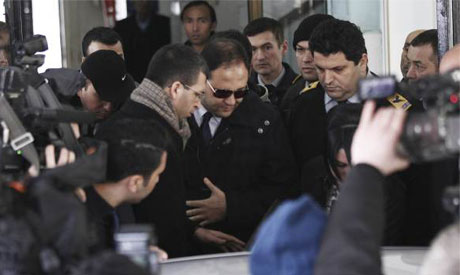
Baris Guler (C in sunglasses), son of Turkey's Interior Minister Muammer Guler, is escorted by plainclothes police officers as he leaves a medical check-up in Istanbul December 16, 2013 (Photo: Reuters)
Five Turkish police chiefs have been dismissed after dozens of people including sons of cabinet ministers were detained in a high-profile probe into bribery and fraud, media reports said Wednesday.
The police raids on Tuesday and the subsequent sackings have highlighted deep rifts in Prime Minister Recep Tayyip Erdogan's support base ahead of key elections in Turkey next year.
The operation sent shockwaves across the country and prompted calls from opposition parties for the resignation of the entire government.
"This is the biggest scandal in the history of the republic," said Engin Altay of the opposition Republican People's Party (CHP). "The prime minister must resign."
At least 50 people were detained in the dawn raids suspected of numerous offences including accepting and facilitating bribes for development projects and securing construction permits for protected areas in exchange for money, as well as gold smuggling and money laundering, according to press reports.
The sons of Interior Minister Muammer Guler, Economy Minister Zafer Caglayan and Environment Minister Erdogan Bayraktar were detained along with well-known businessmen and bureaucrats including the chief executive of Turkish state bank Halkbank, Suleyman Aslan, and construction tycoon Ali Agaoglu.
Police have declined to comment on the sackings or the raids, which were said to be the result of a year-long surveillance operation.
There is speculation the investigation may be linked to a very public dispute between Erdogan's government and a former ally, the influential Muslim cleric Fethullah Gulen.
Gulen lives in exile in the United States, but wields considerable influence in several arms of Turkey's state apparatus including the police, secret services and the judiciary and also runs a network of private schools.
The Gulen movement was a key supporter of Erdogan's Islamic-rooted Justice and Development Party (AKP), helping it to win three elections in a row since 2002.
But government plans unveiled last month to close down a network of private schools run by Gulen's Hizmet movement appear to have shattered the alliance.
"It would not be wrong to see the latest bribery operation... as a new phase in the Gulen-government battle," political analyst Rusen Cakir commented.
He said the Gulen movement has adopted an "attack is the best defence" tactic.
But the government vowed it would not bow to any threats.
"The AKP takes its strength neither from dark forces, nor from the other side of the ocean, nor from dirty alliances," Salih Kapusuz, deputy leader of the AKP, was quoted as saying by the Milliyet newspaper.
In the past, the Gulen movement had helped Erdogan's government in its standoff with the once-powerful armed forces, the self-declared guardians of the secular state.
But the military, which has staged three coups and forced an Islamist-led government from power over the past half century, no longer has the clout to intervene in politics after a series of trials against top army officers.
Signs of discord between Gulen and Erdogan had emerged in 2012 over the role of Turkey's spy chief Hakan Fiden and relations deteriorated during the nationwide anti-government unrest in June.
The demonstrations bruised Erdogan's image, highlighting concern about what critics say is the government's increasingly authoritarian policies and efforts to impose his conservative Islamic values on society.
Although Erdogan remains the most powerful figure in Turkish politics, commentators say the feud with the Gulen movement has the potential to cause splits within his party.
Erdogan and the AKP face key tests in local polls in March, which will be followed by a presidential ballot in August and legislative elections in 2015.
Two AKP lawmakers, including a former international footballer, have already quit the party in the space of less than three weeks because of their opposition to government policies.
"If someone asks me if things will be the same as they were in the past, I'd say no," said Huseyin Gulerce, a columnist with the Zaman newspaper which is owned by the Gulen movement.
Short link: